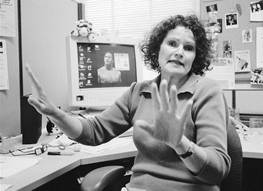Dragon Info ILSP-The Transition to Adulthood Tamika
Bennett Barbara
Bradshaw- Jason Kathy
Garcia
|
ILSP Social Worker Barbara Bradshaw "Find out who your mother is now, while we can still help."
July-August 2001 by Richard Bermack Barbara Bradshaw has been a social worker for 18 years. She likes working with teens in ILSP the best. “Teens are independent,” she explains. “You don’t have as much of the concerns about the kids being abused as when you are working with children. . . . [The children] have massive trust issues, so they are not always going to tell you if they are being abused. When you find out two years later that this kid was being sexually molested, it makes you sick. You never know what the hell is going on in the house. “We don’t have those concerns in ILSP. It is more positive. We are planning for their future. How are you going to support yourself? What adults do you have in your life that you can ask for support? I try to get then to check out their parents. A lot of these kids have fantasies about their parents. ‘Oh my mom is really okay, and the system has colluded to snatch me away from my high functioning wonderful family,’ they think. So I urge them to check out the family. “The mother who abandoned them or whipped and beat them at three or four years old, they don’t have those issues at 17. Up until then, we would tell them, ‘You can’t go over to your mother’s house because she might be high.’ Now we say, ‘Why not check out your mother? If she is high, that is something you need to know. You better go check it out now while you are still in care because six months from now, if you have this big fantasy that you are going to go home, and then you actually go home, and after three weeks it wipes out, you are out of the system. You are stuck. Find out who your mother is now, while we can still help.’ “Some kids have a pretty good reality base, but some don’t. I don’t think a lot of these kids will ever be able to resolve the relationship with their mothers. It is so conflicted, with so many layers of emotions and abandonment and sadness.” Validating Their Feelings “I show them their file and tell them, ‘This is why you are in care and not with your mother, because she moved in her boyfriend and allowed him to molest you, and when you told her, she allowed it to continue.’ I don’t try to be negative, but I tell them, ‘This is who your mother is, and she was unable to protect you.’ Then I’ll tell them, ‘I’m really sorry your mother was never able to give you decent care. I’m really sorry you never got to have the relationship with your mother you really wanted.’ Kids need that kind of validation. Some people will tell them, ‘Oh come on, it could be worse,’ but I think it is powerful to validate their feelings.” “Many of their parents are still scrambling. They don’t have a place to live. When their kids turn 18, the parents will seek the kids out because they think they can go sponge off them. Their parents are so low functioning that any time they see someone who has a leg up on them, they want to grab on to them and be pulled up. I’ve had that happen to a couple of kids. But for others, mom has gone to drug therapy and has gotten her life together and is now able to take the kids home.” Ken Shaw, ILSP supervisor, estimates that perhaps half the biological parents of the youth leaving foster care have improved their lives to the point they can have some sort of positive interaction with their sons or daughters.
|
||||||

